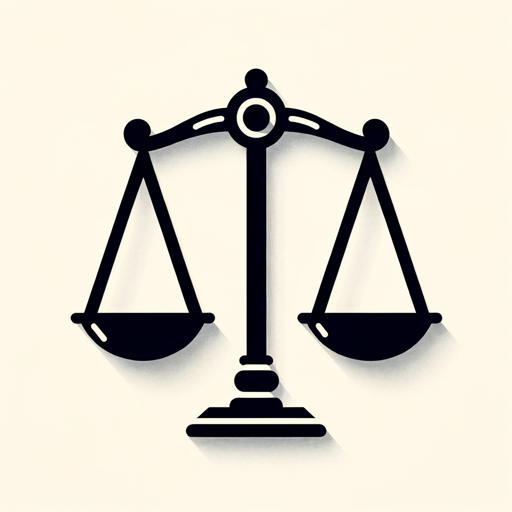LawGPT-AI-powered legal document analysis.
AI-driven legal analysis made simple.
Explain this clause in my contract:
What are the implications of this law?
Analyze this court decision for key points.
Rewrite this clause to be more fair.
Related Tools
Load More
LegalGPT
Specialized in legal matters, this GPT could assist lawyers and legal professionals with case research, legal documentation, and even help in predicting case outcomes based on historical data.

LegalGPT (German Law)
~ Assistent für Vertragsklauseln nach deutschem Recht ~ Spezialisierung auf Risikominimierung in der Gestaltung und Überprüfung aller Vertragsarten ~ Angabe von Gesetzen, relevanten Urteilen und Fachliteratur ~

Australian Law School Super GPT
Use the Australian Law School Super GPT to get help with concepts, statutes and cases. Control verbosity of responses by using the command v=1-5. Updated: 21 May 2024

EU Law GPT
Expert in EU legal analysis, detail-oriented responses

Super Paralegal GPT
Acts as a super competent paralegal

LawGPT
Specialized in legal research and advice
20.0 / 5 (200 votes)
Introduction to LawGPT
LawGPT is an AI-based legal assistant designed to provide in-depth analysis and explanation of legal texts such as contracts, laws, and court decisions. It is tailored for legal professionals, businesses, and individuals who need help interpreting complex legal language, identifying key provisions, and understanding legal principles. LawGPT's core function is to simplify the complexity of legal language while maintaining legal accuracy. For example, a user seeking to understand the implications of a 'force majeure' clause in a contract would receive a detailed breakdown of the clause's meaning, real-world application, and its potential legal impact based on relevant case law. LawGPT is also equipped to balance multiple interpretations of legal texts, helping users consider different perspectives on a legal issue. In a scenario where a user wants to analyze a court decision, LawGPT could extract the key legal reasoning, explain how the court applied precedent, and identify the broader legal implications.

Main Functions of LawGPT
Legal Document Analysis
Example
A user uploads a complex business contract with several clauses, and LawGPT provides a clause-by-clause analysis, explaining the meaning of each provision, its potential risks, and benefits to the user.
Scenario
A small business owner is reviewing a contract for a supplier agreement. LawGPT helps the owner understand the implications of the payment terms, confidentiality clauses, and termination rights, allowing the business owner to negotiate more effectively.
Interpretation of Legislation
Example
LawGPT explains the meaning and application of a recently passed environmental regulation, detailing the key provisions, obligations, and potential penalties for non-compliance.
Scenario
An environmental consultant needs to understand the nuances of new regulatory changes regarding waste management. LawGPT breaks down the legal text, identifies the compliance requirements, and explains the penalties for violations, allowing the consultant to provide accurate advice to clients.
Court Decision Breakdown
Example
LawGPT summarizes a Supreme Court decision, explaining the legal reasoning, majority opinion, dissenting opinions, and its implications for future cases.
Scenario
A law student researching a landmark case can use LawGPT to gain a detailed understanding of the case's outcome, the reasoning behind the judgment, and the broader implications for constitutional law.
Ideal Users of LawGPT
Legal Professionals (Lawyers, Paralegals, and Law Students)
Lawyers and paralegals can benefit from LawGPT by using it as a research assistant for complex legal texts. It helps by breaking down case law, legal statutes, and contracts into manageable insights, saving time and ensuring a comprehensive understanding of key legal issues. Law students, on the other hand, can use it as a study tool to understand complicated case rulings, analyze different legal theories, or gain clarity on legislative changes.
Businesses and Non-Legal Professionals
Small business owners, contract managers, and consultants can leverage LawGPT to make informed decisions on legal matters without having to hire expensive legal counsel. It is particularly helpful for reviewing contracts, understanding regulatory compliance, and navigating legal risks, thus empowering businesses to handle legal matters independently where possible.

How to Use LawGPT
1
Visit aichatonline.org for a free trial without login, and no need for ChatGPT Plus.
2
Input your legal document or question, making sure to provide context and specify which legal aspects you're focusing on (e.g., contracts, court rulings, legislation).
3
Clarify the type of assistance needed: clause explanation, legal concept interpretation, or summarizing legal arguments.
4
Review the response, ensuring that the interpretation is relevant to your query. LawGPT can handle complex legal terminology and break it down into simpler terms.
5
Refine or ask follow-up questions for more in-depth analysis, and consider using it for a variety of legal documents like contracts, policies, and legal opinions.
Try other advanced and practical GPTs
Scientific Writing
AI-Powered Scientific Writing Assistance

Prompt Injection Maker
AI-powered prompt injection crafting.

Image to PDF Converter
AI-powered image to PDF converter

Crypto Advisor GPT
AI-Powered Cryptocurrency Investment Insights.
Poster Maker
AI-powered poster design made easy

Web Explorer
AI-Powered Insights at Your Fingertips

Message Optimizer
AI-powered text refinement made easy.

Digital Task Manager [GPT4.5 Unofficial]
AI-powered task manager for better productivity.
![Digital Task Manager [GPT4.5 Unofficial]](https://files.oaiusercontent.com/file-KP4z2F5VPwg5DvFA68nyHwra?se=2123-10-27T00%3A21%3A06Z&sp=r&sv=2021-08-06&sr=b&rscc=max-age%3D31536000%2C%20immutable&rscd=attachment%3B%20filename%3D9cef1660-96f0-4ddf-b1cb-ee1aacc17595.png&sig=TBsi4pQ2TVmTic1iP7ntYOeWCbBwT0cSCzThofAApmU%3D)
G man the builderS
AI-Driven Project Material Management.

Doctor-Approved Cannabis, Marijuana, and CBD
AI-powered insights for cannabis therapies

AI競馬予想家ジピ太郎
AI-powered horse racing predictions

Where's Waldo?
AI-powered 'Where's Waldo?' adventure.

- Legal Research
- Case Analysis
- Regulatory Compliance
- Contract Review
- Legal Drafting
LawGPT Q&A
What types of legal documents can LawGPT assist with?
LawGPT can analyze a wide range of legal documents including contracts, court rulings, legislation, policies, and legal opinions. It specializes in interpreting legal language and breaking down complex clauses.
How accurate is LawGPT in interpreting legal language?
LawGPT leverages a sophisticated AI model to accurately interpret legal language. While it provides insightful analysis, users should verify critical legal matters with a qualified legal professional.
Can LawGPT explain specific clauses in contracts?
Yes, LawGPT can break down and explain specific clauses in contracts, highlighting their implications, legal risks, and common interpretations in the context of applicable laws.
Is LawGPT useful for non-lawyers?
Absolutely. LawGPT simplifies complex legal language, making it useful for anyone, including non-lawyers, seeking to understand legal documents or legal concepts.
Can LawGPT provide legal advice?
LawGPT provides detailed analysis and explanations but does not offer legal advice. Users should consult a licensed attorney for legally binding advice on their specific situations.